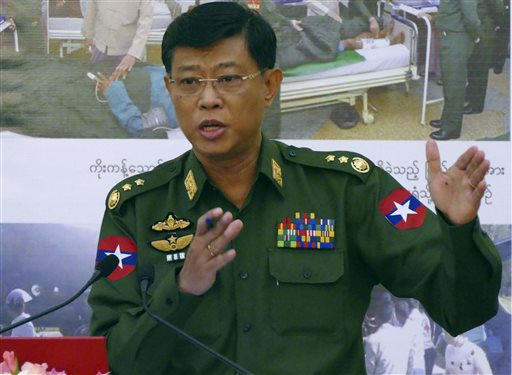
Myanmar’s Chief of Military Affairs Security, Lt. Gen. Mya Tun Oo, talks to journalists during a press conference at the Defense Ministry Saturday, Feb. 21, 2015, in Naypyitaw, Myanmar. Myanmar’s army Saturday said more than 130 people had died in a deepening battle with rebels in the northeast, declaring it would not rest until stability was restored to the border area which tens of thousands have fled. AP
NAYPYIDAW, Myanmar–Myanmar’s army Saturday said more than 130 people had died in a deepening battle with rebels in the northeast, declaring it would not rest until stability was restored to the border area which tens of thousands have fled.
Fighting raged in the remote Kokang region of Shan state where conflict erupted on Feb. 9 when insurgent attacks on soldiers triggered a military onslaught, prompting at least 30,000 civilians to escape into bordering China.
In the first press conference since clashes began, defense ministry spokesman Lieutenant General Mya Htun Oo said the conflict had killed 61 military and police officers and around 72 insurgents.
“The fighting is strong… Because of serious fighting, our helicopters are helping,” he told reporters in the capital Naypyidaw. “We will not retreat until we get stability.”
He did not provide figures on civilian deaths in and around Laukkai town, where the conflict has centered, as efforts to evacuate communities remain hampered by an attack Tuesday on a local Red Cross convoy which wounded two aid workers.
The spokesman blamed the attack on the rebels: “Our military only provides protection to civilian convoys… We are going to take action against Kokang rebels’ offense.”
The ethnically Chinese Kokang rebels or National Democratic Alliance Army (MNDAA), who are fighting for regional autonomy, have denied attacking the convoy.
The conflict, the first major unrest in the region since 2009, has renewed doubts over a government attempt to forge a nationwide ceasefire in a country peppered with ethnic insurgencies.
Myanmar’s quasi-civilian government has put the ceasefire agreement at the heart of its reforms as the nation prepares for a general election later this year.
But the fighting has raised fears those efforts are unravelling.